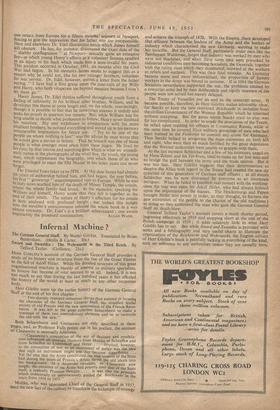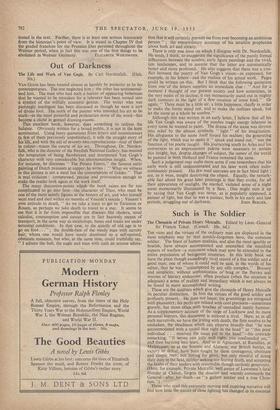Infernal Machine?
The German General Staff. By Walte'r GOrlitz. Translated by Brian Battershaw. & Carter. 30s.)
HERR Goiturz's account of the German General Staff provides a study of its history and structure from the rise of the Great Elector to the fall of Adolf Hitler. While the detailed structure of this great organisational machine is mainly of interest to military specialists, its history has become of vital interest to us all. Indeed, it is not too much to say that during the last hundred years it has affected the history of the world at least as much as any other corporate body.
Herr Gorlitz sums up the earlier history of the German General Staff at the end of his first chapter :
" Two sharply opposed influences (have) thus assisted in forming the character of the German General Staff, the stratified feudal society of old Prussia and the new nationalism of the French Revo- lution. It was left .to the great .reformer Scharnhorst to make a synthesis of these two, contradictory elements and so to reconcile the old with the new."
Both Scharnhorst and Gneisenau are ably described in these
Pages, and, as Professor Falls points out in his preface, the account of Clausewitz is unusually felicitous.
" Clausewitz's conception of the war of decision and annihila- tion influenced all strategic thinkers from Moltke to Schlieffen and from Schlieffen to Ludendorff and Hitler.... Implicit, however, in the conception of war as an instrument of policy was the idea that such an instrument might one day become superfluous.... Yet the' idea that the Army constituted the true content of the State had during the years of Prussia's defeat thrust the old ideals into the background. In a desperate situation, so Clausewitz now taught, the existence of the Army had priority over that of the State itself, a typically Prussian thought.... It was also the principle which consciously or unconsciously guided the Reichswehr in the years from 1918 to 1933."
Moltke, who was appointed Chief of the General Staff in 1857, used the new fact of the railway to transform the technique of strategy and.achieve the triumph of 1870. With the Empire, there developed That .alliance between the leaders of .the Army and the leaders• of industry which characterised the new Germany, seeming to make her invicible. But the General Staff, particularly under rnen like the flamboyant Waldersee, forgot that industry was worked by men who were not machines, and when these same men were provoked by industrial conditions into becoming Socialists, the Generals, together with the ruling class which they dominated, scowled at the workers as rebels and outlaws. This was their fatal mistake. As Germany 'became more and more industrialised, the proportion of factory workers in the Army was bound to increase. If in 1914 the German Socialists nevertheless supported the war, the problems created by a conscript army led by men deliberately and rigidly unaware of the people were not solved ,but merely delayed.
The Treaty of Versailles put an end to the conscript army. It became possible, therefore, as Herr Gorlitz makes admirably clear, for Seeckt to keep the new restricted Reichswehr in isolation from the civilian Government of the Weimar Republic which he tolerated without accepting. But the game which Seeckt tried to play was far too complicated. In order to evade the provisions of the Treaty, he relied upon training his officers in Communist Russia, while at the same time he covered illicit military groupings of men whohad been trained in the Freikorps to commit any crime for Germany. Thus Seeckt helped to invigorate the mass extremists on both left and right, who were then so much fortified by the great depression that the •Weimar authorities were unable to grapple with them.
At the last moment Schleicher and a few of his intimates, urged on by Hans Zehrer and his Tat-Kreis, tried to make up for lost time,and to bridge the gulf between the army and the trade unions. But it was too late. Herr Gorlitz suggests that their determination to deceive the Allies with regard to the Treaty had created the new sly cynicism of this generation of German staff officers ; at all events Schleicher was by now distrusted by everyone as an inveterate intriguer. When he failed to-establish real contact with the working- class the way was open for Adolf Hitler, who had always insisted upon the importance of the masses. The Hindenburgs and Papen brought Hitler into power in order, as thoy thought, to harness the new extremism of the people to the chariot of the old traditions 1 in doing so they enthroned the man who gave the German General Staff its death-blow.
General Telford Taylor's account covers a much shorter period, beginning effectively in 1918 and stopping short at the end of the Polish campaign in 1939 ; it adds relatively little to what Herr Gorlitz has to say. But while Sword and Swastika is provided with notes and a bibliography and very useful charts to illustrate the organisation of the Reichswehr and Wehrmacht, the English edition of Herr GOrlitz's book is painfully lacking in everything of the kind, with no reference to any authorities unless they are casually men. tioned in the text. Further, there is at least one serious inaccuracy from the historian's point of view. It is stated in Chapter IV that the graded franchise for the Prussian Diet persisted throughout the Weimar period, when in fact this was one of the first things to be



















































 Previous page
Previous page